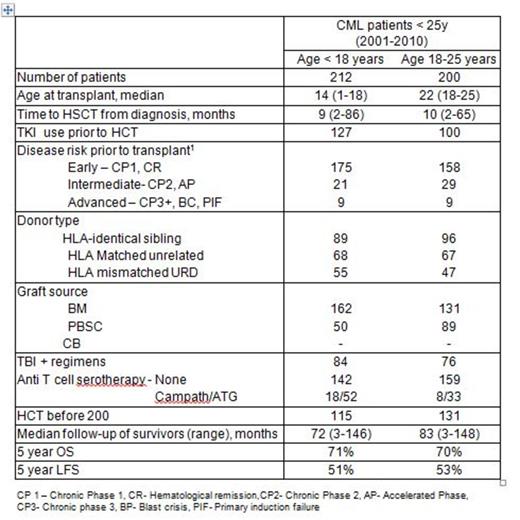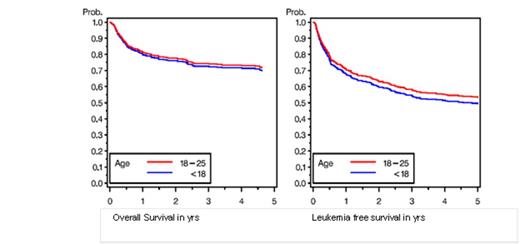Abstract
Chronic myeloid leukemia (CML) in pediatrics is rare accounting for 2–3% of leukemias. Data on allogeneic hematopoietic cell transplantation (HCT) in this group is scarce. Since the introduction of tyrosine kinase inhibitors (TKI), HCT in patients with CML especially with early disease has decreased. Children and young adults have long life expectancies, lower morbidity with HCT and are likely to recieve prolonged TKI therapy with increased risk for complications. HCT for early disease may still benefit this population.
We retrospectively evaluated outcomes in CML patients receiving myeoloablative HCT reported to the CIBMTR, comparing pediatric patients (n= 212) to young adults (n=200). Table 1 describes patient variables.
5 y overall survival (OS) and leukemia free survival (LFS) in <18 y was 71% (95%CI 65-77) and 51% (95%CI 43-58) respectively. In adjusted analysis, there was a statistically insignificant effect of prior TKI therapy on LFS (P=0.07), OS (0.06), transplant related mortality (TRM) (P=0.47) or relapse (P=0.88). Favorable factors for OS were early disease, matched sibling donors (MSD), bone marrow (BM) or cord blood (CB) grafts. LFS was superior with total body irradiation (TBI), non alemtuzumab based regimens and recent (>2006) HCTs. 5 year OS and LFS for the 18-25y group was 71 (95%CI 65-77)% and 53 (45-60)% respectively. In adjusted analysis there was no difference in OS (P=0.7), LFS (P=0.4) for 18-25y group compared to the pediatric group. Favorable factors for OS/DFS remained early disease, MSD and BM grafts.
Allogeneic HCT outcomes were comparable in children and young adults. HCT should remain an option for young patients with CML especially with a MSD using TBI containing regimens with BM as the stem cell source. We could not show an advantage for TKI use prior to HCT. Long term toxicities of TKI and allogeneic HCT need to be further evaluated in this group.
HiJiya:Pfizer: Consultancy; Jazz: Consultancy; Enzon: Consultancy; Sanofi: Consultancy.
Author notes
Asterisk with author names denotes non-ASH members.



